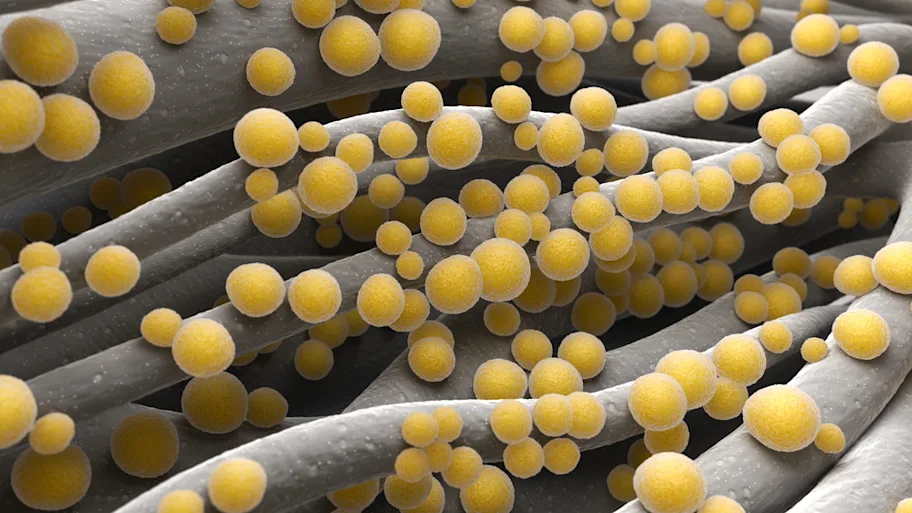
- Science news
- Featured news
- Toxins override key immune system check
Toxins override key immune system check

Multi-resistant S. aureus produced more toxin than drug-sensitive strains, resulting in a more dramatic immune response. Image: Shutterstock.
S. aureus bacterial toxins can cause a deadly immune system overreaction — but could be harnessed to enhance immune responses to tumors
— by Technical University of Munich
Staphylococcus aureus bacteria can cause numerous diseases, such as skin infections, pneumonia and blood poisoning (sepsis). The strong immune response triggered by the bacteria is an aggravating factor here. One reason for this lies in specific bacterial toxins – as established by a team from the Technical University of Munich (TUM) and University of Tübingen. These toxins reduce the number of cells capable of suppressing the immune response — so multi-resistant strains, which produce very high levels of enterotoxin, become even more dangerous.
Staphylococcal Enterotoxins Dose-Dependently Modulate the Generation of Myeloid-Derived Suppressor Cells► Read original article► Download original article (pdf)
During an infection, Staphylococcus aureus releases a harmful cocktail containing various substances into the body – including Staphylococcal enterotoxins A and B (SEA and SEB). Researchers at TUM and the University of Tübingen (both Germany) set out to determine whether these bacterial toxins play a role in excessive immune responses to the pathogens.
To this end, the researchers examined the impact of these substances on a particular group of immune cells called myeloid-derived suppressor cells or MDSCs. These cells check the immune system, preventing immune responses from becoming too strong and harming the body rather than helping it.
Toxins ramp up immune response
The study’s director, Assistant Professor Dr. Nikolaus Rieber, is Consultant specializing in infectious diseases and rheumatology at Munich-Schwabing Children’s Hospital (Kinderklinik München Schwabing), which is jointly operated by TUM and the Munich Clinic (München Klinik). Together with his team, Rieber tested around twenty different Staphylococcus aureus strains — including ones resistant to many different antibiotics. These multi-resistant bacteria pose a serious problem in hospitals, as they spread to patients already weakened by other diseases and the resulting infections are extremely difficult to treat.
Related: Failing immune system ‘brakes’ help explain type 1 diabetes in mice
During their investigations, Rieber and his team were able to determine that the concentration of enterotoxins has a modifying effect on the suppressing MDSCs. Where certain strains released high levels of toxin, this resulted in a much lower number of inhibitor immune cells. Lower levels of toxin had the opposite effect — more MDSCs were then present.
“We are not yet able to say exactly whether the high concentrations of toxins lead the MDSCs to die off, or whether fewer of them are produced in the first place. But the outcome is the same: the immune response is no longer effectively kept in check and escalates too far,” Rieber explains.
The multi-resistant strains, in particular, were found to produce very high levels of enterotoxin. “On top of their resistance to antibiotics, this makes them even more dangerous. They trigger excessive immune responses and thus weaken the body still further,” outlines Rieber.
Potential use in cancer treatment
This newly acquired knowledge about the effect of the toxins could also be harnessed in the fight against cancer, Rieber reveals. The problem with tumors is often that the immune system no longer actively combats the cancer because inhibitor mechanisms are too strong. Looking at how a therapy along these lines might work, Rieber explains: “One possibility would be to use weakened enterotoxins to induce stronger immune responses at the tumor site. This could mean the cancer cells are targeted more effectively again.” The researchers also now aim to investigate the molecular mechanism behind the effect they observed.
Original article: Staphylococcal Enterotoxins Dose-Dependently Modulate the Generation of Myeloid-Derived Suppressor Cells
REPUBLISHING GUIDELINES: Open access and sharing research is part of Frontiers’ mission. Unless otherwise noted, you can republish articles posted in the Frontiers news blog — as long as you include a link back to the original research. Selling the articles is not allowed.






